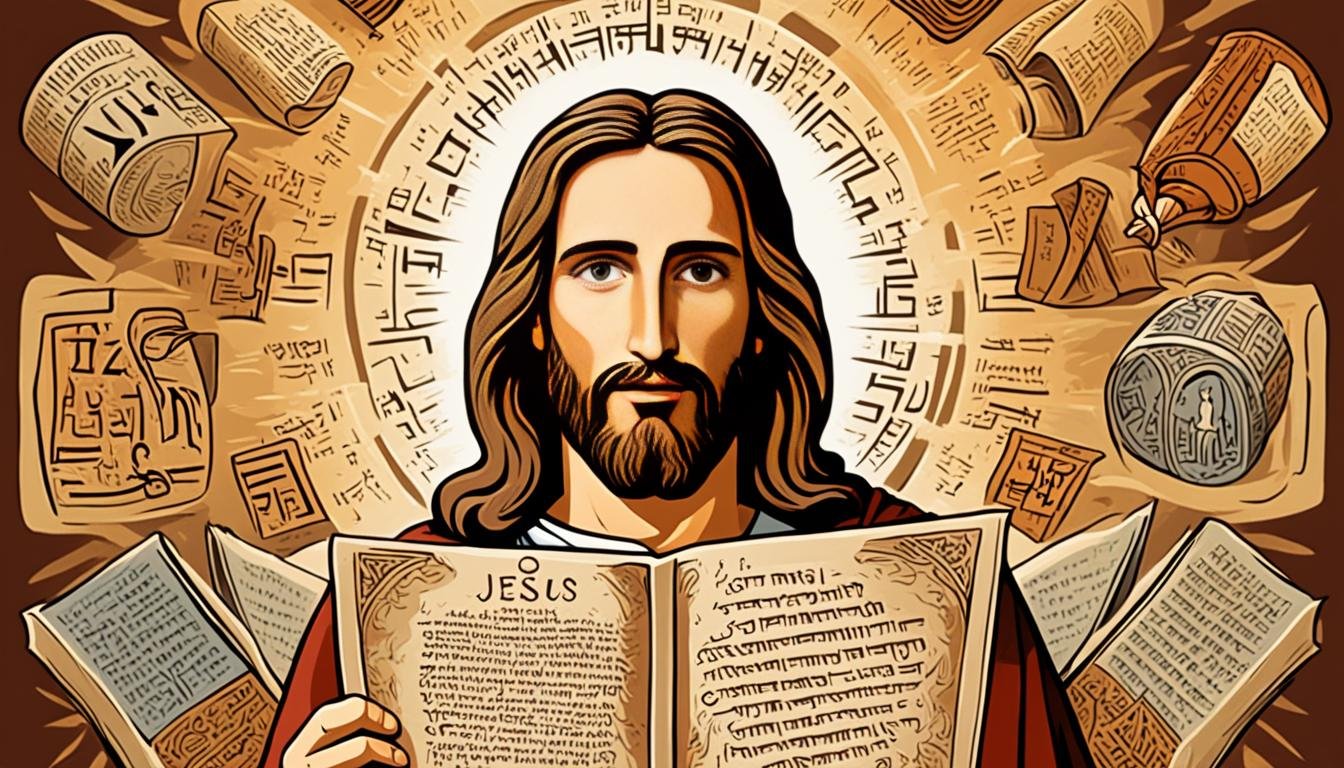In the biblical context, discussions often arise regarding whether Jesus was a Nazirite, as some traditions suggest. However, a closer examination of the scriptures reveals that Jesus was, in fact, a Nazarene and not a Nazirite.
The confusion between these terms is understandable but important to clarify. While being a Nazarene denotes someone from the town of Nazareth, a Nazirite is an individual who has taken a specific vow before God, as outlined in Numbers 6.
When examining the requirements for being a Nazirite, it becomes evident that Jesus did not fulfill these criteria. He drank wine, performed miracles involving wine, touched dead bodies, and there is no biblical mention of the length of his hair. These actions clearly demonstrate that Jesus was not living as a Nazirite.
Key Takeaways:
- Jesus was a Nazarene, not a Nazirite, and the terms should not be confused
- A Nazirite is someone who takes a special vow before God, which Jesus did not fulfill
- Numbers 6 provides the biblical guidelines for being a Nazirite, and Jesus’ actions do not align with these requirements
- While Jesus fulfilled the prophecy of being called a Nazarene, this does not imply he was a Nazirite
- Paul’s example of taking a vow suggests that it was acceptable for believers to make and fulfill a Nazirite vow, but this is not a requirement for all Christians
Difference between Nazarene and Nazirite
Many people often confuse the terms Nazarene and Nazirite due to their similar spellings. However, it is important to understand the distinction between the two. While Jesus is referred to as a Nazarene because he hails from Nazareth, he did not adhere to the regulations set forth for a Nazirite under the Mosaic Law. This confusion arises from the divergent meanings associated with the two terms.
Unlike Nazarenes, who simply originate from Nazareth, Nazirites are individuals who voluntarily take a special vow before God, subjecting themselves to specific requirements outlined in Numbers 6 of the biblical scriptures. The confusion between these two terms stems from their close association with Jesus and the similarity in their spelling, leading individuals to mistakenly assume that Jesus was a Nazirite.
While Jesus was called a Nazarene, he did not follow the rules set out for a Nazirite in the Mosaic Law.
As a Nazarene, Jesus identified with his hometown of Nazareth and its significance in his ministry. However, he did not fulfill the obligations of a Nazirite. According to Numbers 6, a Nazirite was required to abstain from wine, keep their hair unshaved, and refrain from contact with the dead.
Contrary to these requirements, Jesus frequently drank wine, performed miracles involving wine, and is described in the Bible as touching dead bodies. Moreover, the length of Jesus’ hair is not mentioned in scripture, another key aspect of being a Nazirite.
It is important to distinguish between being a Nazarene, which relates to Jesus’ hometown, and being a Nazirite, which encompasses a specific vow and adherence to the regulations detailed in Numbers 6. This clarity is crucial to understanding Jesus’ identity and his relationship to both Nazareth and the Nazirite tradition.
| Nazarene | Nazirite |
|---|---|
| The term refers to someone from the town of Nazareth. | The term refers to someone who takes a special vow before God. |
| Jesus was referred to as a Nazarene because he was from Nazareth. | Jesus did not fulfill the requirements of a Nazirite vow. |
| The confusion arises from similar spellings and the association with Jesus. | There are specific regulations for a Nazirite outlined in Numbers 6. |
Biblical Guidelines for Being a Nazirite
Numbers 6 provides us with the biblical guidelines for taking a Nazirite vow, a sacred commitment before God. These requirements outline the specific behaviors and rituals that a Nazirite must adhere to during the duration of their vow.
The biblical guidelines for being a Nazirite include:
- Abstaining from wine: A Nazirite must refrain from consuming any wine or grape products throughout the duration of their vow. This commitment symbolizes their dedication and separation unto God.
- Keeping one’s hair unshaved: Another significant aspect of the Nazirite vow is maintaining unshaved hair. This outward sign of consecration distinguishes the Nazirite and serves as a visible marker of their commitment.
- Staying away from dead bodies: As part of the Nazirite vow, one must avoid all contact with corpses, ensuring spiritual purity and separation from death.
Once the Nazirite has completed the designated period of their vow, they must follow specific rituals and bring sacrifices to conclude their consecration. As part of this process, they are required to cut their hair and offer it as a sacrifice to God.

These biblical guidelines serve as a framework for individuals undertaking a Nazirite vow, providing direction and structure to their spiritual commitment. By faithfully following these requirements, those who take the vow demonstrate their devotion to God and their desire to be set apart for His purposes.
Jesus’ Actions and the Nazirite Vow
Jesus’ actions clearly demonstrate that he did not fulfill the requirements of a Nazirite vow. According to Numbers 6 in the biblical context, a Nazirite is expected to adhere to specific guidelines, such as abstaining from wine, keeping one’s hair unshaved, and avoiding contact with dead bodies. However, Jesus engaged in actions that would have violated these requirements, indicating that he was not living as a Nazirite.
Firstly, Jesus regularly drank wine and even performed miracles involving wine, as seen in John 2:1-11 when he turned water into wine at the wedding in Cana. This goes against the Nazirite vow, which prohibits the consumption of grape products.
On the third day, there was a wedding in Cana of Galilee, and the mother of Jesus was there. Now both Jesus and His disciples were invited to the wedding. And when they ran out of wine, the mother of Jesus said to Him, ‘They have no wine.’ Jesus said to her, ‘Woman, what does your concern have to do with Me? My hour has not yet come.’ His mother said to the servants, ‘Whatever He says to you, do it.’ Now there were set there six water pots of stone, according to the manner of purification of the Jews, containing twenty or thirty gallons apiece. Jesus said to them, ‘Fill the water pots with water.’ And they filled them up to the brim. And He said to them, ‘Draw some out now, and take it to the master of the feast.’ And they took it. When the master of the feast had tasted the water that was made wine, and did not know where it came from (but the servants who had drawn the water knew), the master of the feast called the bridegroom. And he said to him, ‘Every man at the beginning sets out the good wine, and when the guests have well drunk, then the inferior. You have kept the good wine until now!’ This beginning of signs Jesus did in Cana of Galilee, and manifested His glory; and His disciples believed in Him.”
Secondly, Jesus did not adhere to the requirement of avoiding contact with dead bodies. In several instances, he touched and even resurrected dead bodies, such as in the story of Jairus’ daughter (Mark 5:35-43) and Lazarus (John 11:1-44). This would have been a direct violation of the Nazirite vow.
While He was still speaking, some came from the ruler of the synagogue’s house who said, ‘Your daughter is dead. Why trouble the Teacher any further?’ As soon as Jesus heard the word that was spoken, He said to the ruler of the synagogue, ‘Do not be afraid; only believe.’ And He permitted no one to follow Him except Peter, James, and John the brother of James. Then He came to the house of the ruler of the synagogue, and saw a tumult and those who wept and wailed loudly. When He came in, He said to them, ‘Why make this commotion and weep? The child is not dead, but sleeping.’ And they ridiculed Him. But when He had put them all outside, He took the father and the mother of the child, and those who were with Him, and entered where the child was lying. Then He took the child by the hand, and said to her, ‘Talitha, cumi,’ which is translated, ‘Little girl, I say to you, arise.’ Immediately the girl arose and walked, for she was twelve years of age. And they were overcome with great amazement. But He commanded them strictly that no one should know it, and said that something should be given her to eat.
Lastly, there is no mention in scripture regarding the length of Jesus’ hair, which is an important aspect of the Nazirite vow. In Numbers 6:5, it states that a Nazirite must let their hair grow long throughout the duration of the vow and then shave it off. The absence of any reference to Jesus’ hair in relation to the Nazirite vow suggests that he did not observe this particular requirement.
| Violations of the Nazirite Vow by Jesus |
|---|
| Drinking wine, including performing miracles involving wine |
| Touching and resurrecting dead bodies |
| No mention of hair length in relation to the vow |
Based on these actions, it is evident that Jesus did not live in accordance with the restrictions and rituals outlined in the Nazirite vow. While he was often referred to as a Nazarene due to his association with the town of Nazareth, Jesus was not a Nazirite.
Did Jesus fulfill the prophecy of being a Nazarene?
According to the Gospel of Matthew, it is mentioned in Matthew 2:23 that Jesus would be called a Nazarene. However, there is no specific Old Testament passage that uses these exact words. The prophecy of Jesus being called a Nazarene is believed to be connected to the general messianic expectation that the Messiah would come from a despised place like Nazareth and would be humble and rejected.
“He will be called a Nazarene.”
This prophecy does not imply that Jesus was a Nazirite, as the terms Nazarene and Nazirite have distinct meanings. Instead, it highlights the connection of Jesus to the town of Nazareth, which fulfills the broader expectation of the Messiah’s humble origin and rejection.
It is important to note that the fulfillment of this prophecy does not require Jesus to adhere to the specific requirements of being a Nazirite, as outlined in the Old Testament.
| Prophecy | Fulfillment |
|---|---|
| Jesus would be called a Nazarene | Fulfilled through Jesus’ association with Nazareth and the fulfillment of messianic expectations of humility and rejection |

Despite the lack of a specific Old Testament reference, the fulfillment of the prophecy of Jesus being called a Nazarene underscores the significance of Jesus’ connection to the town of Nazareth and his embodiment of the messianic expectations.
Paul’s Example of Taking a Vow
In the book of Acts 18:18, there is a mention of the apostle Paul taking a vow that involved cutting his hair. This act of haircutting typically occurs at the end of a Nazirite vow, indicating that Paul saw it as acceptable to make and fulfill a Nazirite vow. However, it is important to note that Paul’s example does not imply that all Christians must observe the Nazirite vow.
Paul’s Vow and Nazirite Traditions
Paul’s decision to take a vow demonstrates his commitment to fulfilling religious practices within the Jewish tradition. As a former Pharisee, Paul was well-versed in the Mosaic Law and the customs of his time. The Nazirite vow, outlined in Numbers 6, was one such practice that involved specific requirements regarding abstinence from certain substances, hair growth, and contact with the dead.
“For this reason, Paul took a vow to honor his spiritual devotion and express his dedication to serving God. His vow demonstrated his willingness to go above and beyond in fulfilling his religious duties.”
The Significance of Paul’s Vow
Paul’s decision to take a Nazirite vow signaled his deep commitment to his faith and his desire to set an example for others. By voluntarily subjecting himself to the requirements of the Nazirite vow, Paul showed his devotion to God and his willingness to go the extra mile in his dedication to spiritual practices. Additionally, his vow may have served as a tool to connect with and relate to Jewish audiences, allowing him to better communicate the message of Christ and bridge the gap between different cultural traditions.
| Vow Component | Paul’s Actions |
|---|---|
| Abstain from wine and grape products | Paul’s writings indicate that he saw no issue with consuming wine (e.g., 1 Timothy 5:23), suggesting that he did not strictly adhere to this aspect of the Nazirite vow. |
| Keep hair unshaved | Paul’s vow involved cutting his hair, which signifies that he likely allowed it to grow throughout the duration of his vow (Acts 18:18). |
| Avoid contact with dead bodies | While the Bible does not specifically mention Paul avoiding contact with dead bodies, it is conceivable that he would have made efforts to adhere to this aspect of the vow out of respect for the tradition. |
Paul’s example of taking a vow provides insight into how early Christians navigated their faith within the context of their cultural and religious backgrounds. It emphasizes the freedom believers have in choosing to participate in certain religious practices while also highlighting the importance of individual conviction and personal commitment in matters of faith.
Liberty to Observe the Sabbath
In the New Testament, Christians have the liberty to choose whether or not to observe the Sabbath. While the Sabbath was an important aspect of Jewish tradition and observance in the Old Testament, the New Testament teaches that the Sabbath has been fulfilled in Jesus Christ and is no longer binding upon believers.
The concept of liberty in Christ means that believers are free from the requirements of the Law of Moses, including the observance of the Sabbath. The apostle Paul, in his letters, emphasizes that believers are justified by faith in Jesus Christ and not by adherence to the works of the law. This includes the Sabbath, which is seen as a shadow of the true rest found in Christ (Colossians 2:16-17).
However, it is important to note that while believers have the freedom to observe the Sabbath if they choose to do so, it is not a requirement. The New Testament encourages believers to gather together for worship, teaching, and fellowship, but the specific day of the week is not mandated.
The emphasis in the New Testament is on the spiritual rest found in Jesus Christ, rather than the strict observance of a specific day. Jesus himself declared, “Come to me, all you who are weary and burdened, and I will give you rest” (Matthew 11:28). Believers are called to find their rest in Jesus and experience the freedom and liberty that he offers.
“For freedom Christ has set us free; stand firm therefore, and do not submit again to a yoke of slavery.” – Galatians 5:1
The Difference between Legalism and Liberty
Although Christians have the liberty to observe the Sabbath if they choose to do so, it is important to distinguish between legalism and liberty. Legalism is the belief that strict adherence to religious rules and regulations is necessary for salvation or spiritual growth. Liberty, on the other hand, recognizes that salvation is by grace through faith in Jesus Christ and that the Christian life is characterized by freedom and joy in following Him.
The New Testament teaches that believers are not under the law but under grace (Romans 6:14). This does not mean that believers are free to live in sin, but rather that their obedience to God is motivated by love and gratitude for what Christ has done for them.
In conclusion, while Christians have the liberty to observe the Sabbath if they choose to do so, it is not a requirement according to the Law of Moses or the New Covenant. The focus in the New Testament is on finding rest and freedom in Jesus Christ, rather than strict observance of a specific day. Believers are called to live in the freedom and joy that comes from being in a relationship with Jesus, trusting in his finished work on the cross for salvation.

Jesus’ Relationship with God the Father in Heaven
The Bible does not explicitly state whether Jesus actively worships God the Father in Heaven. While there is a profound relationship of love, honor, and fellowship between the members of the Trinity, the specific terminology of worship is not used in reference to Jesus and God the Father in Heaven.
Throughout the New Testament, Jesus is shown to have a deep reverence and submission to God the Father. He consistently acknowledges the Father’s authority and seeks to do His will. In John 5:19, Jesus declares, “Truly, truly, I say to you, the Son can do nothing of his own accord, but only what he sees the Father doing. For whatever the Father does, that the Son does likewise.”
This passage illustrates Jesus’ complete dependence on the Father and his desire to follow His lead. Jesus’ relationship with God the Father can be characterized by intimacy, obedience, and a shared purpose in accomplishing the salvation of humanity.
“I and the Father are one.”
While the concept of worship may not be explicitly mentioned, Jesus does receive worship from others throughout the New Testament. This indicates his divine nature and rightful place alongside God the Father. For example, after Jesus’ resurrection, Thomas proclaims, “My Lord and my God!” (John 20:28).
In light of these passages, it is clear that while Jesus did not worship God the Father in the same way humans worship Him, there is a unique relationship and reverence between Jesus and God the Father in Heaven. Their unity and shared nature as part of the Trinity demonstrate the divine essence and profound interconnectedness within the Godhead.
Key Points:
- The Bible does not directly state whether Jesus actively worships God the Father in Heaven.
- Jesus demonstrates deep reverence, submission, and obedience to God the Father.
- While not explicitly labeled as worship, Jesus receives worship from others, highlighting his divine nature.
- Jesus and God the Father share an intimate and interconnected relationship within the Trinity.
Conclusion
In conclusion, it is important to clarify that Jesus was not a Nazirite but a Nazarene. While the terms may sound similar, they have distinct meanings in the biblical context. A Nazirite is someone who takes a special vow before God, as outlined in Numbers 6, while a Nazarene refers to someone from the town of Nazareth. Jesus did not fulfill the requirements of a Nazirite vow, as he drank wine, performed miracles involving wine, and interacted with dead bodies, all actions that would have violated the vow. Additionally, there is no mention of the length of his hair, another crucial aspect of the Nazirite vow.
The confusion between Nazarene and Nazirite arises due to their similar spellings, leading to misconceptions. It is essential to differentiate between the two terms to understand Jesus’ background accurately. Jesus was from Nazareth, and his association with that town is what led him to be called a Nazarene. However, this does not imply that he followed the specific rules and regulations of the Nazirite vow.
Furthermore, the New Testament highlights the fulfillment of the Sabbath by Jesus and emphasizes the freedom that believers have when it comes to observing it. While some individuals may choose to observe the Sabbath, it is no longer a binding requirement according to the Law of Moses or the New Covenant. The exact nature of Jesus’ relationship with God the Father in Heaven is not explicitly described in terms of worship, but there exists a relationship of love, honor, and fellowship between them.
FAQ
Was Jesus a Nazirite?
No, Jesus was not a Nazirite. While he was often called a Nazarene because he was from Nazareth, he did not fulfill the requirements of a Nazirite vow as outlined in the Mosaic Law.
What is the difference between a Nazarene and a Nazirite?
The terms Nazarene and Nazirite may sound similar, but they have different meanings. A Nazarene refers to someone from the town of Nazareth, while a Nazirite is someone who takes a special vow before God, as outlined in Numbers 6.
What are the biblical guidelines for being a Nazirite?
The requirements for being a Nazirite include abstaining from wine, keeping one’s hair unshaved, and staying away from dead bodies. After fulfilling the time of the vow, the Nazirite would present sacrifices and cut their hair, offering it as a sacrifice.
Did Jesus fulfill the requirements of a Nazirite vow?
No, Jesus did not fulfill the requirements of a Nazirite vow. He drank wine, ate grape products, touched dead bodies, and there is no mention of the length of his hair. All of these actions would have violated the vow.
Did Jesus fulfill the prophecy of being a Nazarene?
While there is no specific Old Testament passage that mentions Jesus being called a Nazarene, Matthew 2:23 states that he would be called a Nazarene. This is believed to fulfill the general messianic expectation that the Messiah would come from a despised place like Nazareth.
What is Paul’s example of taking a vow?
In Acts 18:18, Paul is mentioned as taking a vow that involved cutting his hair, which is typically done at the end of a Nazirite vow. This suggests that Paul, as a believer and apostle, saw it as acceptable to make and fulfill a Nazirite vow. However, this does not imply that all Christians must observe the Nazirite vow.
Do Christians have to observe the Sabbath?
While Christians have the liberty to choose whether or not to observe the Sabbath, the New Testament teaches that the Sabbath is fulfilled in Jesus Christ and is no longer binding upon believers. Observing the Sabbath is not a requirement according to the Law of Moses or the New Covenant.
What was Jesus’ relationship with God the Father in Heaven?
The Bible does not specifically state whether Jesus actively worshipped God the Father in Heaven. While there is a relationship of love, honor, and fellowship between the members of the Trinity, the specific terminology of worship is not used in reference to Jesus and God the Father in Heaven.
Source Links
- https://www.gotquestions.org/Jesus-Nazirite.html
- https://lifehopeandtruth.com/god/who-is-jesus/was-jesus-a-nazirite/
- https://enduringword.com/was-jesus-a-nazirite-live-qa-for-july-7-2022-2/

I’m Benjamin, a passionate spiritual seeker and creator of Verses and Prayers. Alongside my girlfriend Emma and our pet lizard Mulle, I cherish family life, enjoy exploring new places, and am deeply involved in my church community. My love for reading and singing biblical verses inspires every aspect of my journey.

